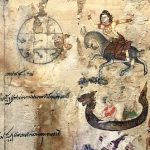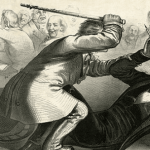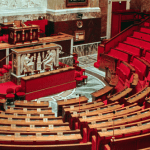 History
History  History
History  Weird Stuff
Weird Stuff 10 Wacky Conspiracy Theories You Will Need to Sit Down For
 Movies and TV
Movies and TV 10 Weird Ways That TV Shows Were Censored
 Our World
Our World 10 Places with Geological Features That Shouldn’t Exist
 Crime
Crime 10 Dark Details of the “Bodies in the Barrels” Murders
 Animals
Animals The Animal Kingdom’s 10 Greatest Dance Moves
 Movies and TV
Movies and TV 10 Box Office Bombs That We Should Have Predicted in 2025
 History
History 10 Extreme Laws That Tried to Engineer Society
 History
History 10 “Modern” Problems with Surprising Historical Analogs
 Health
Health 10 Everyday Activities That Secretly Alter Consciousness
 History
History 10 Dirty Government Secrets Revealed by Declassified Files
 Weird Stuff
Weird Stuff 10 Wacky Conspiracy Theories You Will Need to Sit Down For
 Movies and TV
Movies and TV 10 Weird Ways That TV Shows Were Censored
Who's Behind Listverse?

Jamie Frater
Head Editor
Jamie founded Listverse due to an insatiable desire to share fascinating, obscure, and bizarre facts. He has been a guest speaker on numerous national radio and television stations and is a five time published author.
More About Us Our World
Our World 10 Places with Geological Features That Shouldn’t Exist
 Crime
Crime 10 Dark Details of the “Bodies in the Barrels” Murders
 Animals
Animals The Animal Kingdom’s 10 Greatest Dance Moves
 Movies and TV
Movies and TV 10 Box Office Bombs That We Should Have Predicted in 2025
 History
History 10 Extreme Laws That Tried to Engineer Society
 History
History 10 “Modern” Problems with Surprising Historical Analogs
 Health
Health 10 Everyday Activities That Secretly Alter Consciousness
10 Political Prisoners Who Went On to Become Leaders
What to do with those pesky political opponents? How will we rid ourselves of their opinions and dampen support for their cause before there is an uprising? Before the people realize what is at stake and take to arms. What would a true tyrant do when someone does not fall in line? Jail them, of course. Knock the wind out of their sails by putting them in a cell and keeping their insurgence boxed in, away from the public eyes where their antics can’t make the current regime look weak.
Fortunately for all who value freedom, it’s not always so simple, as real leaders have a knack for finding a way out of sticky situations. Perhaps the most famous example is Nelson Mandela.
Here are ten other political prisoners who rose through the ranks to become leaders themselves.
Related: Ten Vicious & Violent Political Feuds from American History
10 Aung San Suu Kyi
Suu Kyi’s story is one of fabled grandeur. Her father, also a politician, was assassinated when she was two, leaving her mother to care for her. Later, Suu Kyi married and had children before returning to Burma (now Myanmar) to take care of her ailing mother. That was when Suu Kyi got involved with the politics of the time, participating in a non-violent protest against the rule of U Ne Win.
Suu Kyi was placed under house arrest by the military government of the newly formed Union of Myanmar. During that time, she received a Nobel prize, and her husband passed. Against massive political pressure and threats of violence, she persisted in her political aspirations, eventually guiding the country to its first free elections and a victory for Suu Kyi and the National League for Democracy party.
At one stage, after winning the elections, Suu Kyi held four ministerial posts in the new government, eventually giving up two. She was also named state counselor (similar to prime minister), a position higher than the president.[1]
9 Jawaharlal Nehru
As an anti-colonialist, Nehru was arrested and imprisoned nine times for a grand total of over nine years in his various stints in the clink. After spending time in Europe, he returned to India, where he became an early proponent of a free India, emerging as the leader of the intellectual youths. The colonialists did not make life easy for him.
In 1929, he was elected president of the Lahore Session of the Indian National Congress, where Indian independence was at the forefront of its policy before he was imprisoned several times between 1930 and 1935. He was again arrested in 1940 for protesting India’s participation in the war and one last time in 1942 for his longest uninterrupted period of incarceration.
Almost five years after completing his final sentence, Nehru became the first prime minister of an independent India.[2]
8 Vaclav Havel
For a man who spent much of his 40s thrown in jail, released, and then thrown back, Vaclav managed, against all odds, to leave quite an impressive legacy. After the fall of communism and the Soviet Union, Czechoslovakia needed a man who had seen it all to take the reins. That was exactly what Havel was.
A playwright, poet, and dissident who, after an anti-government demonstration erupted in Prague, went on to become the face of the Civic Forum, a coalition of noncommunist opposition groups pressing for change.
Key to the negotiation of what is known as the “Velvet Revolution” (a bloodless pact between coalition groups), Havel was elected as interim president of Czechoslovakia in December of 1989 and then reelected to the presidency in July 1990, becoming the country’s first noncommunist leader since 1948.[3]
7 Anwar Ibrahim
Before his rise to the top, Ibrahim had spent almost 10 years in jail for what some might consider trumped-up charges. The first term—six years—was in 1999 for corruption. While incarcerated, he was slapped with another nine-year sentence for the crime of sodomy in the majority Muslim country (a law which has now been repealed).
To understand Ibrahim’s story, you must understand his relationship with long-time Malaysian Prime Minister Mahathir bin Mohamad. The relationship was good until they disagreed over the implementation of economic recovery measures during the Asian financial crises. Ibrahim was fired and convicted shortly after that.
Fast-forward to May 2018, and the 92-year-old Mahathir pledged that should he be elected as prime minister again, he would seek a royal pardon for Ibrahim, which he did. Sultan Muhammad V agreed to the request. Ibrahim was released five days later, resumed his life in politics, and won a seat in parliament in 2018 and prime minister in 2022.[4]
6 Ho Chi Minh
Born to a poor family in the times of French colonial rule, Ho began his political career in France as an active socialist, organizing the Vietnamese living there into a movement that gained him some social recognition among the right people.
A staunch fan of Leninist Russia and its socialist policies, Ho made various trips to Moscow and relied on them to hide him from the powers that were in leadership at the time. They wanted French rule continue in the various regions of Vietnam.
When France was defeated by Germany during the early years of WW2, Minh saw an opportunity to advance his cause and established the Viet Nam Doc Lap Dong Minh Hoi (League for the Independence of Vietnam). The organization was forced to seek assistance from the Chinese leaders at the time, who distrusted Ho Chi Minh as a communist, and he was arrested before spending 18 months in a Chinese prison.
With the elimination of the two strongest adversaries of the Viet Minh (Japan at the hands of the USA and France at the hands of the Germans), the way was paved. He collaborated with the U.S. against Japan, and after the defeat of Japan, Ho Chi Minh declared Vietnam independent.[5]
5 Kim Dae-Jung
Kim, born in 1924, came from the most humble beginnings and a daring escape from communists during the early days of the Korean War. But it wasn’t until the 1950s that he became the beacon of democratic hope as he gained a reputation as one of South Korea’s most charismatic and naturally likable politicians.
But years and years of criticism of a communist government can only lead to hefty prison sentences or worse. Kim was in and out of jail and under house arrest numerous times, but it was when President Park Chung-hee had Kim arrested on charges of conspiracy and sedition that the death sentence finally came for him. Spared from the death penalty by Park’s successor, Kim was allowed to leave for the U.S., which effectively also served as an exile from South Korea.
It wasn’t until 1997, after several attempts at becoming president, that he took the victory, also winning the Nobel Peace Prize in 2000.[6]
4 Lech Walesa
When Walesa lost his job for participating in the 1970 food riots, the seeds had been sowed. Walesa’s mind had been made up, and his political alignments were all but written in the stars.
Walesa was well known for his role in forming what was known as the Solidarity Trade Union. Still, after Solidarity was outlawed and martial law was imposed in Poland, the leaders of Solidarity, which included Walesa, were arrested and detained for almost a year. Much to the ire of the Polish government, Walesa was awarded the Nobel Peace Prize in 1983.
After public pressures, Solidarity was restored, and free elections were held. Solidarity won an overwhelming majority of seats in the upper house of parliament. Walesa ran for president in 1990 and won Poland’s first direct presidential election by a landslide.[7]
3 Adolf Hitler
When reading about political prisoners, one expects the victims of Hitler, rather than the Fuhrer himself, to be the unfortunate prisoners. But not many know that in his rise to power, Hitler also spent time behind bars. In what was known as the Beer Hall Putsch, Hitler and his acolytes attempted a coup in Munich, which was foiled by the government of the time.
Hitler was charged with high treason, convicted, and sentenced to five years in prison, ultimately spending less than a year locked up, just enough time to complete his autobiography Mein Kampf and formalize his manifesto.
It was after his release from prison that his notorious rise to power began, with many citing his imprisonment as an event that galvanized support for his growing Nazi movement.[8]
2 Joseph Stalin
Before becoming one of the most notorious leaders in Russia’s history, Stalin had to be bent and shaped by his circumstances like most others on this list. Born Josef Vissarionovich Djugashvili, he only took the name Stalin, or man of steel, in his thirties when he began to take control of his own destiny.
Heavily influenced by the German philosopher Karl Marx, he became an underground political player, organizing labor demonstrations and strikes. It was here where Stalin was roped into various illegal and illicit activities, which included robbing banks and then using the proceeds to fund the Bolshevik Party.
Between 1902 and 1913, Stalin was arrested numerous times and imprisoned or exiled to Siberia. While in exile in Switzerland, he was appointed to serve on the first Central Committee of the Bolshevik Party, which overthrew the government of the time three years later, seizing power and appointing Lenin as their leader, with Stalin in his wake. The rest is history.[9]
1 Eugene V. Debs
A five-time Socialist candidate for the presidency, Debs was known as an outspoken leader of the labor movement that originated in the booming manufacturing and industrial sectors of the prosperous post-WWI United States.
As an early proponent of socialism in a world that demanded long hours and little pay, Debs proved to be an unpopular man with the powers that be. After leading a rally that clashed with government troops, Debs was sentenced to six months in prison for contempt of court. It was in jail that the socialist rhetoric that would later form the basis of his political voice was sharpened. In 1898, Debs served on the Executive Board of the newly founded Social Democratic Party of America (SDP), also called the Social Democratic Party of the United States.
Debs ran four consecutive losing presidential campaigns as a candidate for the Socialist party after his release but was again thrown in jail in 1918 for violating the Espionage Act and speaking out against the U.S. involvement in the First World War. He garnered a million votes in his fifth and final campaign for the presidency that he ran from prison. Debs was released from prison a year later.[10]








